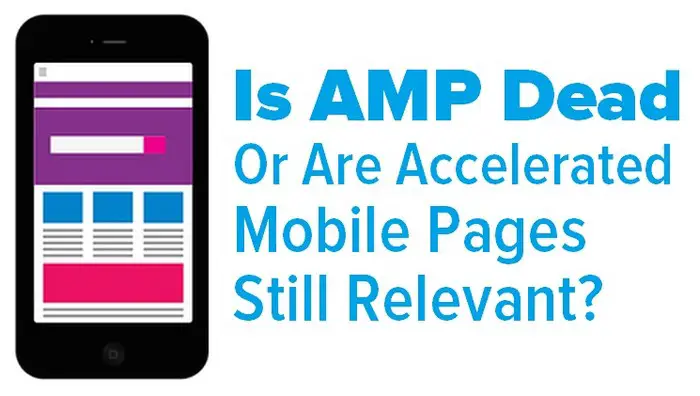In this new article, we are returning to the subject of Accelerated Mobile Pages or as it is also known AMP and ask the question is the AMP Project dead and is AMP still relevant in today’s mobile search world?
Let’s get started!

What are Accelerated Mobile Pages (AMP)?
Accelerated Mobile Pages are lightweight pages designed to give the mobile user a superfast site experience making content easier to read and more engaging for the visitor.
Is AMP good for SEO?
AMP is NOT a search engine optimization ranking factor or SEO hack. But reading between the lines we know that site speed is an extremely strong SEO ranking factor.
AMP delivers a fast, reliable web experience providing a great UX for visitors. So in terms of speed and UX AMP is good for SEO.
The AMP project is officially open-source but has sponsors such as WordPress, LinkedIn, Twitter, Pinterest, and Bing who contributed to its development. AMP was also widely promoted by Google, to the extent where it really became a Google project.
With the development of Google’s Mobile-First Index AMP was heralded as a speed game-changer for webmasters and a new way to succeed in search appealing to the mobile-first index.
Is AMP still relevant today?
When AMP was launched back in 2015 it was surrounded by controversy and confusion. It promised faster pages and better rankings but demanded radical mobile optimization. There were a large number of early adopters, but most developers remained very skeptical.
At the time AMP was big news in the world of SEO dividing popular opinion. When implemented correctly it does deliver super-fast load times but at the same time stripped away much of what we love about desktop browsing. Recent announcements have led to questions about the future of AMP and questioning if AMP is still relevant today and if the positives of Accelerated Mobile Pages still outweigh the negatives?
Is Amp Dead or are Accelerated Mobile Pages still relevant today?Click To TweetIs Amp Dead? Is Amp still a thing?
The big pull for webmasters who adopted AMP was that it was relatively simple to incorporate (especially for WordPress with the official AMP plugin) and a quick fix for slow sites.
Another big influencer for site owners adopting AMP was that AMP pages were/are at the time of writing, given preferential treatment within the SERPs and shown within the Top Stories Carousel. Google insists that AMP does not give a direct ranking boost. However, Interactions with fast-loading AMP sites send positive user signals giving them a rankings boost and the inclusion in an AMP-only stories carousel does.
The now-familiar lightning bolt markup found within search results also gives added click-through benefits. You see the lightning bolt you know you should be visiting a fast site so you tend to click these results ahead of others.
All of these benefits meant that AMP pages do rank better.
But this could be about to change.
Has Google lost interest in Accelerated Mobile Pages?
The following quote section is taken directly from the article titled Evaluating page experience for a better web from the Google Search Central Blog
Has Google lost interest in Accelerated Mobile Pages?Click To TweetAs part of this update, we’ll also incorporate the page experience metrics into our ranking criteria for the Top Stories feature in Search on mobile, and remove the AMP requirement from Top Stories eligibility.
Google continues to support AMP, and will continue to link to AMP pages when available. We’ve also updated our developer tools to help site owners optimize their page experience.
Google is dropping its preferential treatment for AMP pages and allowing all pages the chance to appear in the Top Stories feature and this could very well be a killer for AMP.
AMP pages are stripped-down pages which is why they are fast but for many stripped-down pages don’t provide a rich content experience. It is possible to have a fast site without AMP and offer a much better user experience than an AMP version can.
Another nail in the coffin of AMP is the way that Google caches AMP pages.
AMP pages are hosted on Google’s servers allowing Google to cache, preload, and prerender the pages before a user even clicks the link in the SERPs.
You’re not really visiting the site you think your visiting, just a clone on Google.
Monetizing AMP pages with ad providers like Adsense is also more of a challenge because ads are often stripped out in favor of site speed.
What are the benefits of using AMP?
There are many benefits still to using AMP with site speed being the highlight. But unfortunately for AMP site owners, the Top Stories Carousel is no longer an AMP safe place. The SEO playing field has been leveled.
Benefits of using AMP include:
- Decreased bounce rate
- Better time on page
- Additional visibility within search
- Speed
My site runs on AMP, how do I change back to a regular mobile site?
If your site is WordPress-based then this is a relatively simple process. All you have to do is redirect the AMP page links to the regular mobile version links.
This is required to avoid the seemingly endless broken links that would appear when converting from AMP back to standard mobile.
How to remove AMP from your WordPress site
- Download the Redirection plugin from the plugins library and install it.
- Activate the plugin.
- Go to the settings and click Redirects.
- In the source URL box add /(.*)\/amp
- In Target URL add https://YourDomain.com/$1 making sure to change YourDomain to your actual site domain.
- On the URL Options / Regex section select Regex on the pull-down menu
- Save and test that your AMP pages now redirect to the regular pages.
Is Amp Dead or are Accelerated Mobile Pages still relevant today? – Takeaways
So is AMP dead? Well, not at the moment.
Is AMP still relevant? Is Amp still a thing?
There are still plenty of advantages to using AMP. The problem is that one of the really key reasons why many chose to implement AMP has correctly and fairly being removed? This change on Googles part gives all webmasters the same chance of entering into the Top Stories Carousel.
Will AMP eventually die? Very possibly which is another big reason why webmasters have sat on the fence. They just wanted to see what was going to happen.
Now it is over to you.
Do you have a site?
Have you implemented accelerated mobile pages?
Do you think AMP is relevant today?
Perhaps recent announcements have convinced you to change back?
Let us know in the comments section below
Regards Dexter
Related Articles:
What Are Google Web Stories And How Do You Build Them?
Affiliate Marketing In 2021 – 7 Tips For New Marketers To Follow












Lynda Vivan
There are numerous benefits still to utilizing AMP with location speed being the main. But shockingly for AMP site owners, the Best Stories Carousel is not and AMP secure space. The SEO playing field has been leveled.
Dexter Roona
Yes the playing field has been levelled, however AMP sites are fast so that gives them a good chance of still getting into the story carousel. We will have to see what AMP owners do. Will they revert back and provide a more content rich environment or will they cling onto the speed side of things and hand their sites over to Googles servers?